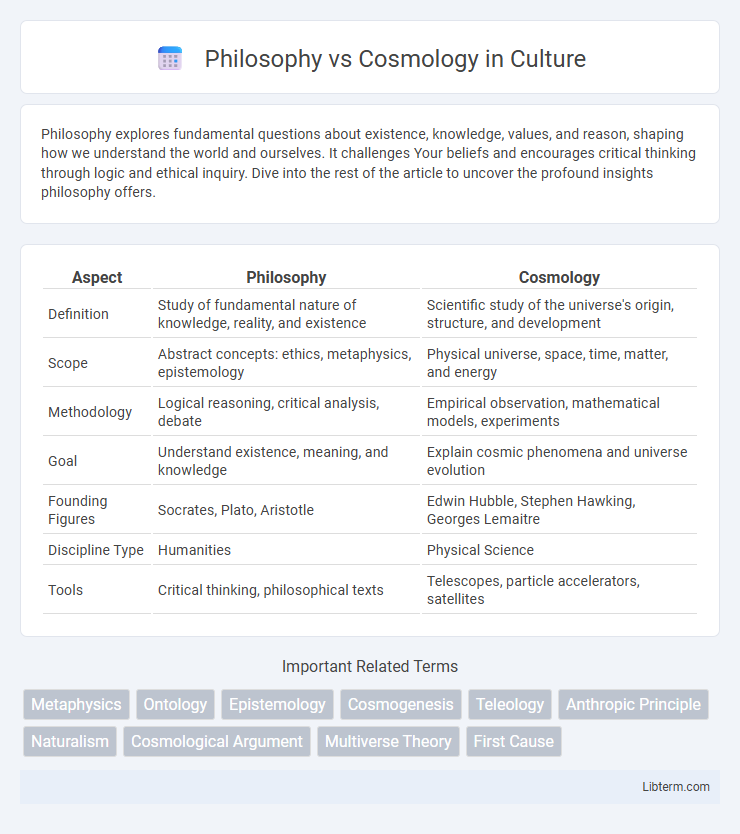Philosophy explores fundamental questions about existence, knowledge, values, and reason, shaping how we understand the world and ourselves. It challenges Your beliefs and encourages critical thinking through logic and ethical inquiry. Dive into the rest of the article to uncover the profound insights philosophy offers.
Table of Comparison
| Aspect | Philosophy | Cosmology |
|---|---|---|
| Definition | Study of fundamental nature of knowledge, reality, and existence | Scientific study of the universe's origin, structure, and development |
| Scope | Abstract concepts: ethics, metaphysics, epistemology | Physical universe, space, time, matter, and energy |
| Methodology | Logical reasoning, critical analysis, debate | Empirical observation, mathematical models, experiments |
| Goal | Understand existence, meaning, and knowledge | Explain cosmic phenomena and universe evolution |
| Founding Figures | Socrates, Plato, Aristotle | Edwin Hubble, Stephen Hawking, Georges Lemaitre |
| Discipline Type | Humanities | Physical Science |
| Tools | Critical thinking, philosophical texts | Telescopes, particle accelerators, satellites |
Defining Philosophy and Cosmology
Philosophy explores fundamental questions about existence, knowledge, ethics, and reason, using critical analysis and logical argumentation to understand human experience and reality. Cosmology scientifically studies the universe's origin, structure, evolution, and large-scale phenomena through observation, mathematics, and physics. While philosophy addresses abstract, conceptual frameworks, cosmology relies on empirical data and theoretical models to explain the cosmos.
Historical Evolution of Both Disciplines
Philosophy and cosmology have evolved through distinct yet interconnected historical trajectories, with philosophy originating in ancient Greece as the inquiry into existence, knowledge, and ethics, while cosmology emerged from early Greek and Mesopotamian observations of the cosmos to scientifically explain the universe. Throughout the Renaissance and Enlightenment periods, cosmology shifted towards empirical methods and mathematical frameworks, exemplified by Copernicus, Galileo, and Newton, whereas philosophy expanded into diverse branches including metaphysics and epistemology. Modern cosmology relies heavily on astrophysics, quantum mechanics, and general relativity, contrasting with contemporary philosophy's focus on analytical and continental traditions addressing abstract conceptual questions.
Key Questions in Philosophy vs. Cosmology
Philosophy addresses key questions about the nature of existence, reality, knowledge, and ethics, exploring concepts such as the meaning of life, consciousness, and moral values through critical reasoning and abstract thought. Cosmology specifically investigates the origins, structure, and evolution of the universe, focusing on empirical evidence related to Big Bang theory, cosmic microwave background radiation, dark matter, and dark energy. Whereas philosophy seeks to understand fundamental truths and human experience, cosmology relies on scientific observation and mathematical models to explain the physical universe.
Methodological Differences: Logic vs. Observation
Philosophy relies heavily on deductive reasoning and logical analysis to explore fundamental questions about existence, knowledge, and reality, emphasizing conceptual clarity and coherence. Cosmology employs empirical observation and data collection from telescopes, satellites, and experiments to study the universe's origin, structure, and evolution through the scientific method. While philosophy prioritizes abstract reasoning, cosmology depends on measurable evidence to develop and test theoretical models.
The Role of Metaphysics in Cosmology
Metaphysics plays a crucial role in cosmology by providing foundational principles that address the nature of existence, the origin of the universe, and the concept of reality beyond empirical observation. While cosmology relies on empirical data and scientific methods to study the structure, evolution, and dynamics of the cosmos, metaphysical inquiry explores fundamental questions about causality, time, and the underlying essence of cosmic phenomena. The interplay between metaphysical frameworks and cosmological theories enhances our understanding of the universe by bridging abstract philosophical concepts with concrete scientific models.
Influence of Cosmological Discoveries on Philosophy
Cosmological discoveries, such as the Big Bang theory and cosmic microwave background radiation, have profoundly influenced philosophy by challenging traditional metaphysical concepts of space, time, and existence. These scientific insights prompt philosophical debates on the nature of reality, causality, and the origins of the universe, reshaping ontological and epistemological frameworks. The intersection of cosmology and philosophy fosters interdisciplinary discourse that deepens understanding of the cosmos and humanity's place within it.
Prominent Thinkers in Philosophy and Cosmology
Prominent thinkers in philosophy such as Plato, Aristotle, and Immanuel Kant laid foundational concepts about existence, knowledge, and reality that intersect with cosmological inquiries. In cosmology, scientists like Nicolaus Copernicus, Edwin Hubble, and Stephen Hawking revolutionized our understanding of the universe's origin, structure, and evolution through empirical evidence and theoretical models. The dialogue between philosophical speculation and cosmological data continues to shape contemporary perspectives on the nature of the cosmos and humanity's place within it.
Areas of Overlap: Where Philosophy Meets Cosmology
Philosophy and cosmology intersect in exploring fundamental questions about the universe's origin, structure, and meaning, blending metaphysical inquiry with scientific investigation. Concepts like time, space, causality, and existence serve as common ground, where philosophical frameworks influence cosmological theories, such as the multiverse hypothesis or the nature of singularities. This overlap fosters deeper understanding by integrating empirical data from astronomy and theoretical physics with ethical and existential reflections inherent in philosophical thought.
Contemporary Debates Bridging Both Fields
Contemporary debates bridging philosophy and cosmology delve into the nature of existence, the origins of the universe, and the interpretation of scientific cosmological models through philosophical frameworks. Discussions often focus on the implications of quantum cosmology, the multiverse hypothesis, and the fine-tuning argument, questioning how empirical data aligns with metaphysical principles. This interdisciplinary discourse promotes a deeper understanding of reality by integrating insights from theoretical physics and analytic philosophy of science.
The Future of Interdisciplinary Inquiry
Philosophy and cosmology converge in exploring fundamental questions about existence, reality, and the universe's origins, driving the future of interdisciplinary inquiry. Advances in quantum mechanics and astrophysics provide empirical data that challenge traditional philosophical frameworks, prompting new theories about consciousness and the nature of time. Collaborative research between philosophers, cosmologists, and cognitive scientists fosters innovative perspectives, shaping a deeper understanding of the cosmos and humanity's place within it.
Philosophy Infographic

 libterm.com
libterm.com